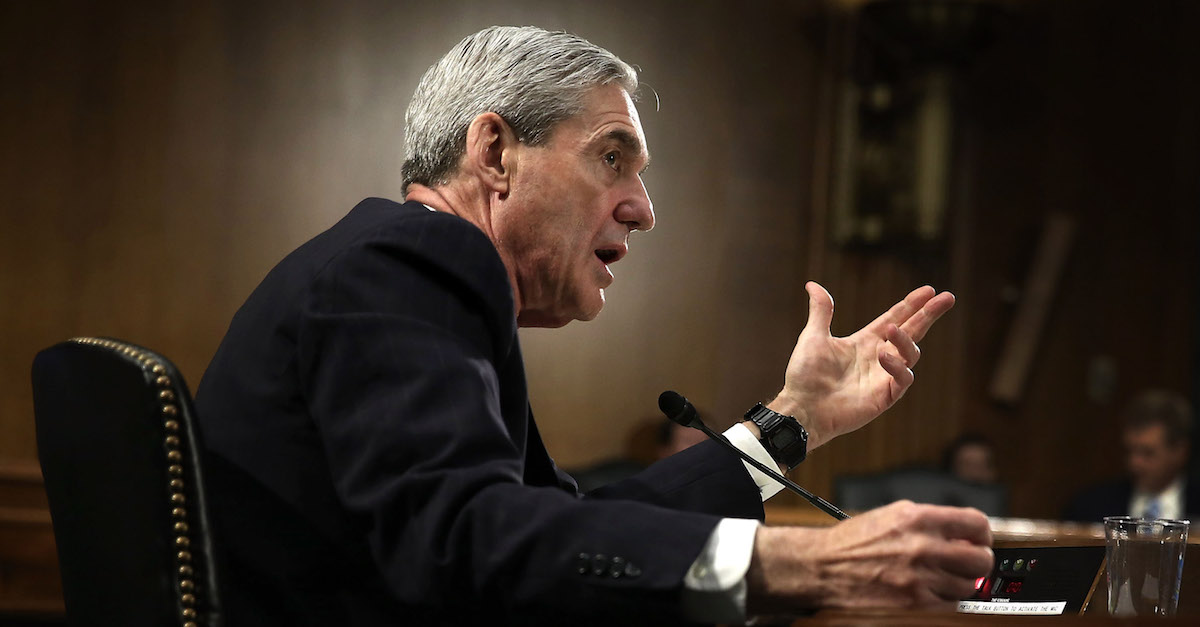
A federal judge on Thursday released several redacted trial court records in an ongoing legal battle between the mystery foreign company owned by a mystery foreign country and special counsel Robert Mueller.
Spread across six separate orders and 71 extremely-redacted pages, the newly public information reveals the special counsel filed a document in the case that’s so hush-hush even the serially secretive and mysterious Mueller nemesis doesn’t have access to it.
This document, apparently, was more than enough to convince Chief U.S. District Judge of the U.S. District Court for the District of Columbia Beryl A. Howell that the foreign company’s commercial activities in the United States bear substantially upon Mueller’s investigation into Russian electoral interference and/or collusion between the Russian Federation and the Trump 2016 campaign.
Page 17 of the second of the package reads, in relevant part:
The [special counsel’s office] argues that the commercial activity exception applies here. Through an ex parte, in camera submission, the [special counsel’s office] has elaborated on the relationship between [REDACTED] Section 1605(a)(2) activities or acts and the materials sought to be produced. Having thoroughly reviewed this ex parte, in camera submission, the Court is satisfied that the [special counsel’s office] has met its burden to show that (1) a Section 1605(a)(2) activity or act is part of the general subject of the grand jury’s investigation and (2) a reasonable possibility exists that the instant subpoena will produce information relevant to such activity or act.
To explain: the submission was made solely by the special counsel’s office without any pretense of sharing it with the opposing party and therefore it was submitted ex parte (one party only). This document was also provided to Judge Howell in a cloistered meeting known in Latinesque legalese as an in camera hearing. There’s no argument from anyone that this is extremely secretive and one-sided.
That’s the point.
In fact, the foreign-owned company notes the secret and one-sided nature of this document, complaining they can’t argue about whether Mueller is correctly applying the exceptions under federal law to sovereign immunity–28 U.S.C. 1605–because the company doesn’t even know what evidence Judge Howell was shown.
Too bad, Judge Howell says, that’s the way the game is played:
“The Court recognizes [the foreign company’s] difficult position in not being privy to the information reviewed and relied upon in resolving the pending motion. The law is well settled, however, that courts may “use in camera, ex parte proceedings to determine the propriety of a grand jury subpoena” when “necessary to ensure the secrecy of ongoing grand jury proceedings.”
Another notable bit from the highly-redacted filings reveals that Mueller’s office requested sanctions of $10,000-per-day for failure to comply with the grand jury subpoena. Although the special counsel acknowledged that penalty might be too low, Judge Howell confirmed she agreed–and then some–by imposing daily sanctions of $50,000 on the company in order to “coerce…compliance.”
How did we get there?
Recall: The foreign-owned company–which hails from an unidentified country–has been locked in something of a stalemate with Mueller since the middle of last August when a sealed grand jury case was filed with Judge Howell.
Mueller’s mystery opponent was subpoenaed just over one month later and has been fighting that subpoena ever since–by way of various appeals to the D.C. Circuit Court of Appeals and even the U.S. Supreme Court itself. The foreign company was eventually slapped with a contempt order by the appeals court–and concomitant court-imposed sanctions–for failure to comply with the original subpoena.
More legal wrangling ensued. Those sanctions were paused courtesy Chief Justice John Roberts and later re-instituted by the whole Supreme Court. The foreign-owned company then made several additional asks for secrecy and those requests were more or less granted for the time being.
Bird’s eye view here: Both lower D.C. courts have been unconvinced by the foreign company’s argument that complying with Mueller’s grand jury subpoena would violate the domestic laws of the country from which the company hails. Their last shot is the U.S. Supreme Court-but while they wait on that review and ruling, they’re being fined $50,000 per day.
[image via Alex Wong/Getty Images]